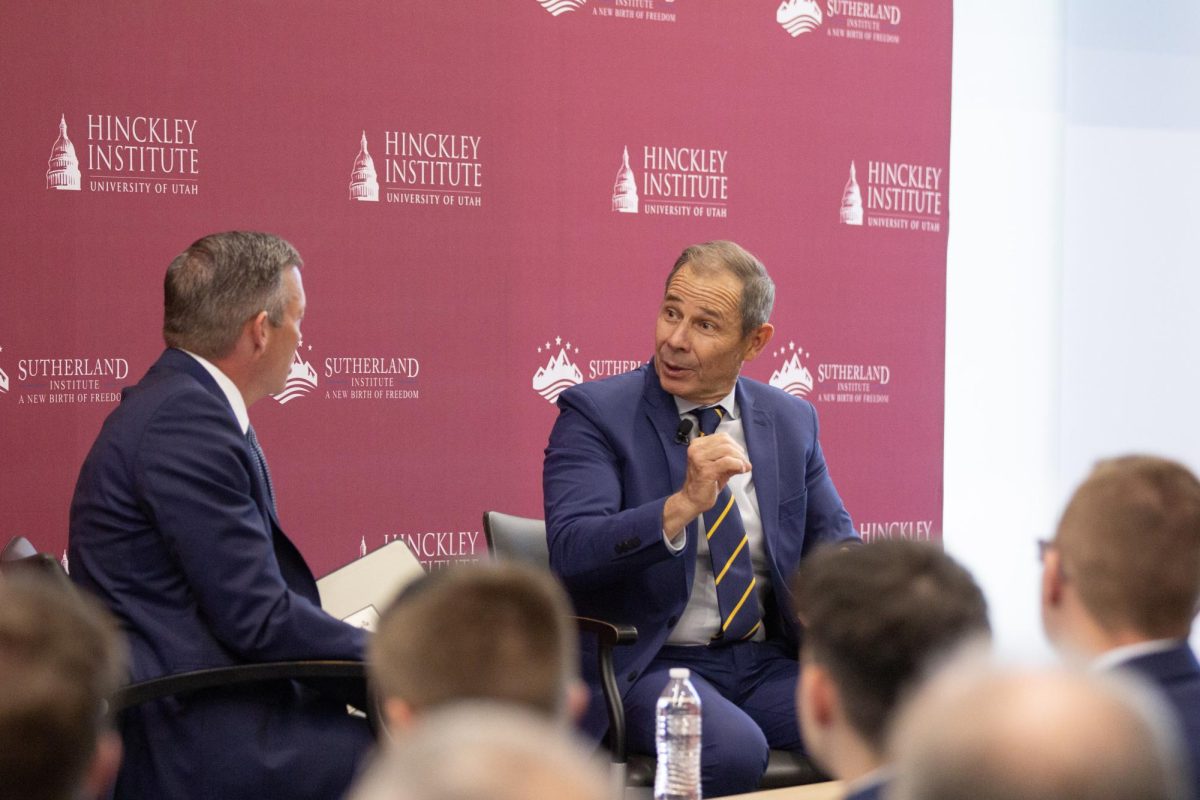“Reinventing the Wheel (But This Time, Let’s Try a Square)” was the topic of Rep. John Curtis’ discussion at the Sutherland Institute’s Congressional Series last week.
“Too often, we want to fix things thinking the wheel is round, and we’re not willing to try a square wheel because everybody knows a square wheel is bad, right?” Curtis said. “And yet, we keep coming up with the same solutions, and they’re not working.”
In addition to wanting to see more creativity in Washington, Curtis also discussed the idea of compromise and his recent trip to the Middle East. He also discussed the Conservative Climate Caucus and the importance of building relationships with constituents.
Curtis, who is running for Senate this year, vying to fill the empty seat following Mitt Romney’s retirement, described how he believes mistakes foster growth and that the U.S. can come up with innovative solutions if lawmakers are given the grace to try new things even if they don’t work out.
“One of the things that I regret about politics is we do not give people an opportunity to fail,” he said, adding that he learned the importance of failure at a young age.
“When I was young, I would go skiing, and I would come home, and you know what my mother would ask every time — it was very predictable: ‘Did you fall?'” Curtis said. “Then she would say, ‘If you didn’t fall, you’re not learning.'”
Compromise Versus Concession
“Constituents don’t like compromise because they view it as you’re giving up half of something,” Curtis said. However, he argued that compromise often results in a better end product.
Curtis pointed to a public lands bill he introduced called the Emery County Public Land Management Act. This act established conservation areas around The Swell. But to get the act passed, Curtis said he had to work with those who opposed it to craft a bill every side could agree on, which ultimately made his bill better.
“That’s good, that’s compromise that constituents can get behind,” he said. “But that takes a lot of explaining … If you’re just watching social media and things like that, you don’t get it. There’s a burden on both the members of Congress to explain and on constituents to take the time to actually study what happened.”
Bills never come down to good versus bad, Curtis said. Instead, it’s often a balancing act between how much good and bad lawmakers see in any given bill.
“You have to make a decision. Is this best with these provisions I like and this one I don’t like, or are these so bad that I need to vote no on the bill?” he said.
Middle East
Curtis also discussed a recent trip to the Middle East. While he acknowledged the intense emotions associated with current events in the Middle East, he argued that there are lessons everyone can agree on regardless of what side of the issue they stand on.
For example, Curtis said his trip helped remind him of the various allies in the Middle East who are willing to work with the U.S.
“Looking at that perspective, I think, helps us reframe the whole conversation about the region that it’s not just us, Israel,” Curtis said. “Jordan, Qatar, Egypt also are our friends and our allies in this, and also see this from a slightly different perspective.”
In all of the conversations he had, Curtis said everyone agreed on the need for a ceasefire in the war between Israel and Hamas.
“This will be kind of interesting, and maybe somewhat controversial, but interestingly, in all of those conversations … people’s feeling that Israel has overreacted didn’t come up once,” Curtis said. “But what did come up every single time is the absolute necessity to find a path to a ceasefire, and that’s what all of these leaders are focused on.”
Conservative Climate Caucus
Curtis started the Conservative Climate Caucus, which focuses on educating House Republicans about climate policies and involving Republicans in climate discussions.
“It is such a helpful turn, in my opinion, for conservatives to be leaning into this,” he said. “Fundamentally, as Republicans, as conservatives, we care deeply about this earth and how we leave it. And in my opinion, we were doing a lousy job of branding that and changing that narrative.”
While Republicans may have different ideas on how to reduce emissions and pollution, Curtis said everyone can agree with wanting to leave the earth better than we found it.
“Leaning into that and having [the narrative] changed in just a few years, to where now Republicans are quite comfortable talking about climate, has been really fun for me,” he said.
Curtis said in the past, Republicans often felt pressure when asked about climate policies. But stripping down the conversation to highlight values shared by everyone on the political spectrum has helped change that.
“The other thing I do is I take people wherever they are,” Curtis said. “So some people just want to have a conversation, but they’re not ready to really jump into this. Fine. I’m not going to judge you. And I think the climate movement is too judgmental and too quick to shame ‘you’re not good enough.'”
Care for Constituents
In 2023, Curtis received a Democracy Award for constituent accountability and accessibility. Among Republican congressmen, Curtis was also ranked the ninth most effective legislator in 2023.
“It’s a mindset that we’re here to serve, that it’s our job to help people and help constituents,” Curtis said.
Curtis said it’s his responsibility to help constituents when they are struggling with a federal agency. If a constituent is facing problems with their passport or veteran benefits, they can call Curtis’ office for help.
“Every interface that you have with a federal agency that’s not going well, that’s my job,” Curtis said. “We try the best we can when that interaction with the federal agency is not going well to facilitate a better solution.”
Curtis also emphasized the importance of public engagement.
“You can let somebody else advocate for you, you can let somebody else legislate for you,” he said. “You can let somebody else make all these decisions for you, and you probably won’t like what they do. Or, you can get engaged and actually change things.”
Constituents have more of a say in federal legislation than they think, Curtis said, but it’s the constituent’s job to use it.



